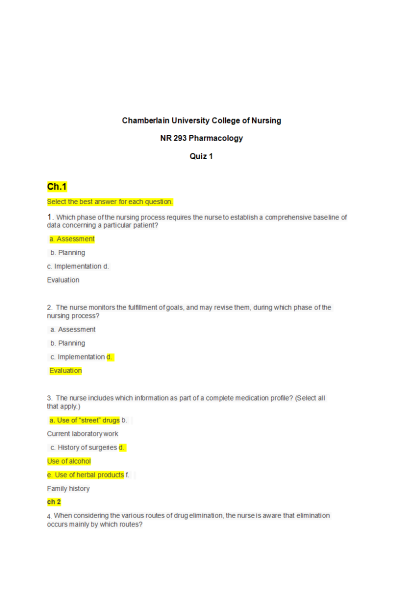Ch.1
Select the best answer for each question.
- Question: Which phase of the nursing process requires the nurse to establish a comprehensive baseline of data concerning a particular patient?
- Question: The nurse monitors the fulfillment of goals, and may revise them, during which phase of the nursing process?
- Question: The nurse includes which information as part of a complete medication profile? (Select all that apply.)
Ch.2
- Question: When considering the various routes of drug elimination, the nurse is aware that elimination occurs mainly by which routes?
- Question: Drug half-life is defined as the amount of time required for 50% of a drug to
- Question: The nurse recognizes that drugs given by which route will be altered by the first-pass effect? (Select all that apply.)
- Question: The nurse is reviewing a list of a patient’s medications and notes that one of the drugs is known to have a low therapeutic index. Which statement accurately explains this concept?
- Question: The nurse prepares to obtain a patient’s blood sample from a central line for a drug level that is to be drawn just before that medication’s next dose. What is the timing of this blood draw known as?
- Question: Match each field of study with the corresponding job description of a person working in that field.
Ch.3
- Question: Which physiologic factor is most responsible for the differences in the pharmacokinetic and pharmaco-dynamic behavior of drugs in neonates and adults?
- Question: Understanding the role of the kidney in the elimination of drugs from the body, which laboratory test assessment is priority in evaluating kidney function?
- Question: Most drug references provide recommended pediatric dosages based on which of the following?
- Question: When giving medications to older adults, the nurse will keep in mind the changes that occur as a result of aging. Which statements regarding changes in the older patient are true? (Select all that apply.)
- Question: Which factor would have the greatest effect on medication response in the newborn?
Chapter 4
- Question: When reviewing drug classifications, the nurse knows that drugs classified as category C-I, which are to be dispensed “only with an approved protocol,” include which drugs?
- Question: When a health care provider is writing a prescription for a drug, he or she is not permitted to mark a refill on the prescription if the drug falls into which category?
- Question: The nurse is aware that the ethical principle of “Do no harm” is known by which name?
- Question: The nurse is performing an admission assessment. Which finding is considered part of the cultural assessment?
- Question: While reviewing a newsletter about medications, the nurse notices that one drug has a new black box warning from the Food and Drug Administration (FDA). What does this warning entail? (Select all that apply.)
- Question: Which term applies to differences observed in patients’ response to medications based on ethnicity?
Ch. 5.
Provide the best answer by filling in the blank for each question.
1. Question: Any preventable unexpected response to a drug involving inappropriate medication use by a patient or health care professional, which may or may not cause
2. Question: A(n) is defined as an unexpected, unintended, or excessive response to a medication given at therapeutic dosages (as opposed to over-dose) and is one type of adverse drug event.
3. Question: A(n) _ is an immunologic reaction resulting from an unusual sensitivity of a patient to a particular medication.
4. Question:. A(n) reaction is any abnormal and
unexpected response to a medication, other than an allergic reaction, that is peculiar to an individual patient.
Ch. 6
- Question: A nurse is preparing for an education session on safe medication administration. Which is the best example of a learning activity that involves the cognitive domain?
- Question: The nurse is developing a discharge plan regarding a patient’s medications. When is the ideal time to begin discharge planning?
- Question: The nurse is providing discharge teaching for a patient who has a new colostomy after a partial colectomy. Reading material at which grade level is most useful for patient education materials?
- Question: An important first step in developing a teaching plan for a patient is
- Question: Which drug classes are commonly used as over-the-counter (OTC) remedies? (Select all that apply.)
- Question: The nurse is reviewing drug therapy with OTC medications. Which is an advantage of OTC remedies?
- Question: A patient is taking paroxetine, a selective serotonin reuptake inhibitor (SSRI), as part of treatment for depression. The patient tells the nurse that he has taken herbal products in the past and shows a list to the nurse. Which herbal product, if taken by the patient who is taking an SSRI, could cause an interaction?
- Question: A patient is asking about side effects of over the counter (OTC) drugs such as NSAIDs. The nurse would be correct in identifying which potential side effects? (Select all that apply.)
- Question: During a clinic visit for a yearly examination, a patient asks the nurse about medications to take for heartburn. The patient shows the nurse the medication bottles that she had in her medicine cabinet. Which of these would be appropriate to use for the patient’s heartburn, after checking for contraindications and other drug interactions? (Select all that apply.)
| Instituition / Term | |
| Term | Summer Term |
| Institution | NR 293 Pharmacology |
| Contributor | Suzzy |






























